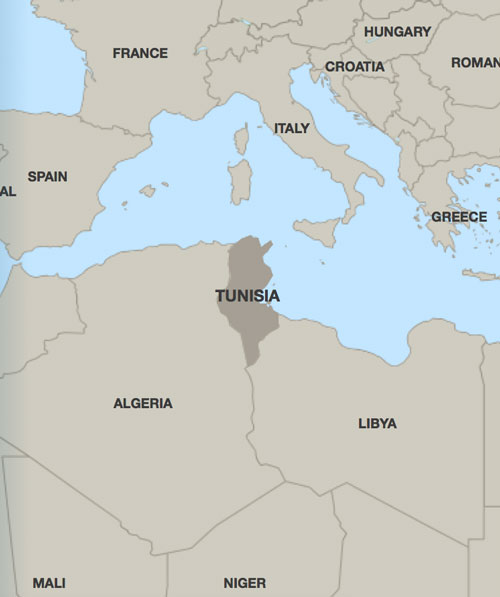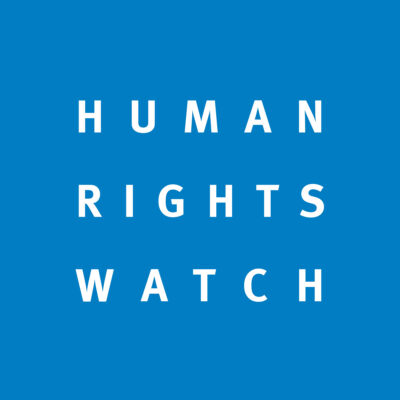After two Tunisian men had a falling out over a loan, they were arrested by police, charged with sodomy, convicted, and sentenced to two years in prison.

Tunisia’s location in North Africa.
Tunisia: Two-Year Sentence for Homosexuality
Arbitrary Detention; Reported Attempt to Require Discredited Anal Exam
(Beirut) – A Tunisian court sentenced two men accused of sodomy to two years in prison on June 16, 2020, Human Rights Watch said today. The decision violates their rights to privacy and nondiscrimination under international law and Tunisia’s 2014 constitution. The police also attempted to subject the defendants to an anal exam, apparently to use as evidence in the case.
Police arrested the two men, both 26, on suspicion of same-sex conduct on June 3 in Le Kef, a city 175 kilometers southwest of Tunis, after one of them filed an unrelated complaint against the other. The prosecutor of the Kef First Instance Tribunal charged the men with sodomy under article 230 of the penal code, which punishes consensual same-sex conduct with up to three years in prison. Hassina Darraji, the lawyer who took on the men’s defense for the upcoming appeal, told Human Rights Watch the defendants told her they had refused the police’s demands that they undergo an anal exam.
“Tunisia’s record of actively prosecuting people for consensual same-sex conduct is deeply worrying and a blatant invasion of their private life,” said Rasha Younes, lesbian, gay, bisexual, and transgender (LGBT) rights researcher at Human Rights Watch. “While states and international bodies have commended Tunisia for its progress on human rights, the criminalization and prosecution of homosexual conduct signals otherwise.”
Damj Association, a Tunis-based LGBT rights organization, told Human Rights Watch that one of the men had filed a complaint against the other regarding an outstanding loan. The police then attempted to persuade them to “confess that they are gay” by bullying, insulting, and threatening to imprison them, Darraji said.
Damj and Darraji said that after they were sentenced, the authorities transferred the men, whose names are being withheld for their privacy, to a prison in Ben Arous, near Tunis, when a prisoner in el-Kef prison contracted Covid-19. The men are now being quarantined in the Ben Arous prison. The two-year sentence, Damj said, is longer than most handed down for sodomy in recent years. The appeals hearing is scheduled for July 8.
During Tunisia’s 2017 Universal Periodic Review (UPR) hearing at the UN Human Rights Council, in response to the recommendation from several countries, Tunisia formally accepted the recommendation to end forced anal exams as a method of “proving” homosexuality. However, Tunisia’s delegation stated: “Medical examinations will be conducted based on the consent of the person and in the presence of a medical expert.”

Human Rights Watch logo
This approach fails to recognize that consent is seriously compromised because trial courts can infer guilt from a refusal to undergo the exam, Human Rights Watch said. Furthermore, the tests are of no scientific or evidentiary value in proving homosexuality. Indeed, such examinations, when forcible, are intrusive, invasive, and amount to cruel, inhuman, and degrading treatment that violates international law. State-sponsored forcible anal exams violate medical ethics and have been recognized as torture by the UN Committee Against Torture.
Tunisian authorities should immediately quash the two men’s conviction and release them, Human Rights Watch said. Tunisia’s parliament should repeal penal code article 230, and the Justice Ministry should direct public prosecutors to abandon prosecutions under article 230 and issue a directive ordering prosecutors to stop sending detainees for anal examinations as part of police investigative procedures to determine suspects’ sexual behavior. Tunisia’s health minister should also direct all forensic doctors under the ministry’s authority to cease all anal examinations for these purposes and to respect people’s right to physical dignity and integrity.
Prosecutions for consensual sex in private between adults violate the rights to privacy and nondiscrimination guaranteed by the International Covenant on Civil and Political Rights, to which Tunisia is a party. The UN Human Rights Committee, which monitors compliance with the covenant, has made clear on several occasions that sexual orientation is a status protected against discrimination under these provisions. The UN Working Group on Arbitrary Detention has found that arrests for same-sex conduct between consenting adults are, by definition, arbitrary.
This conviction appears to contradict the right to privacy and nondiscrimination reflected in Tunisia’s 2014 constitution. Article 24 obligates the government to protect the rights to privacy and the inviolability of the home. Article 21 provides that “All citizens, male and female, have equal rights and duties, and are equal before the law without any discrimination.”
In 2018, the Commission on Individual Freedoms and Equality, appointed by President Beji Caid Essebsi, proposed, among other actions, to decriminalize homosexuality and to end anal testing in criminal investigations into homosexuality. On October 11, 2018, 13 members of the Tunisian Parliament introduced draft legislation for a code on individual freedoms. It incorporated several proposals from the presidential commission including abolition of article 230.
“Tunisia has an opportunity to uphold individual freedoms and everyone’s right to nondiscrimination and bodily integrity by leading the way in decriminalizing same-sex conduct,” Younes said. “It should start by immediately releasing these two young men and halting arrests based on sexual orientation under archaic sodomy laws.”
COMMENTS